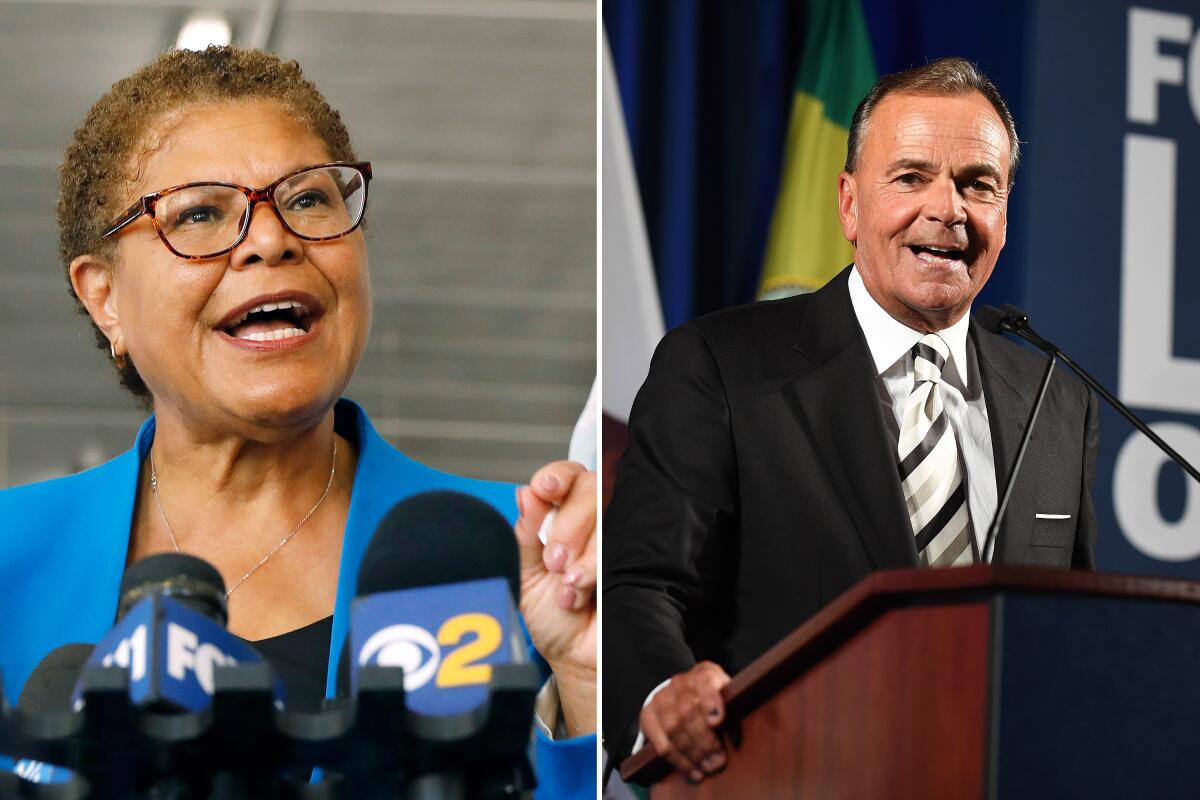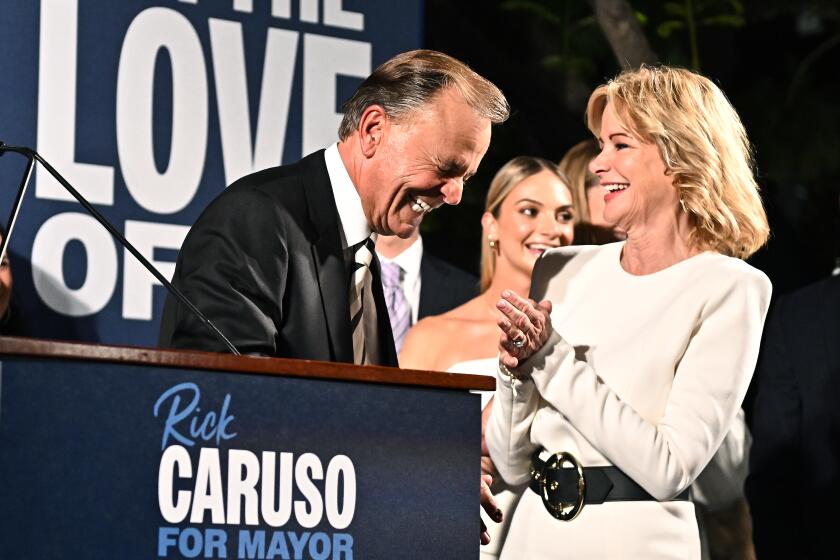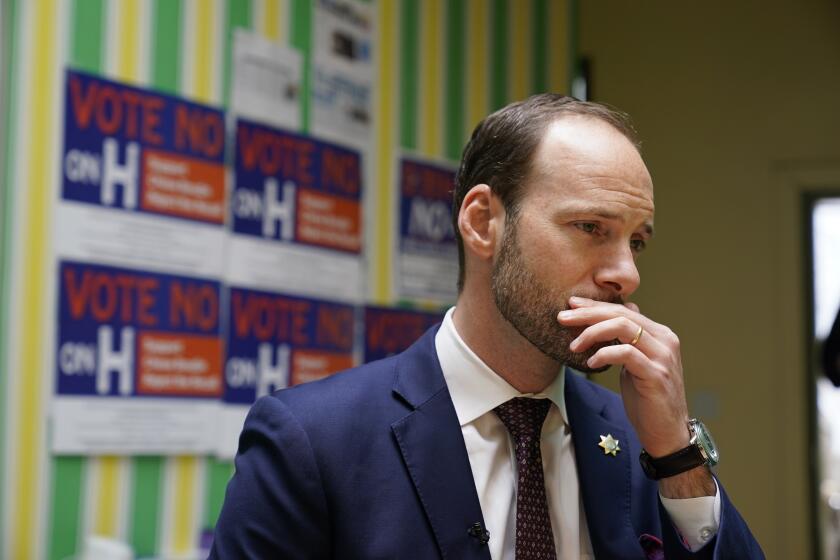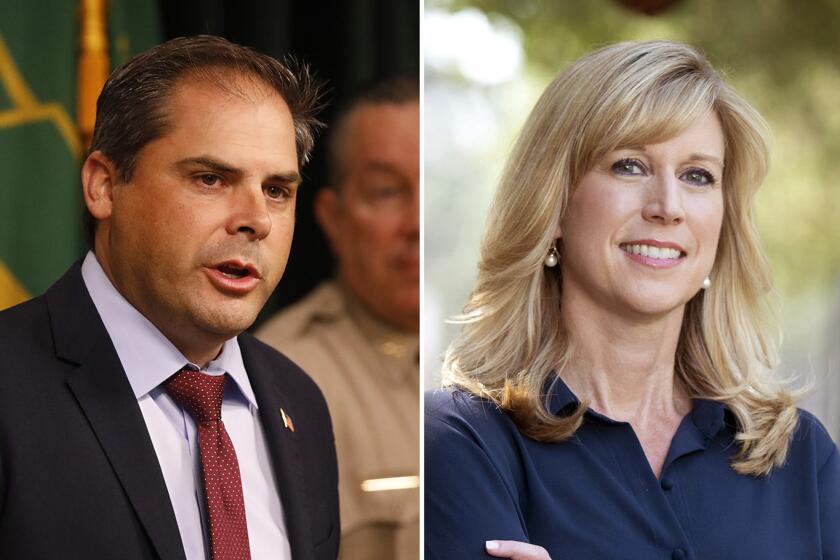Column: California election takeaways: Big money dominated as voters didn’t show up

- Share via
Money didn’t talk in California’s primary election. It screamed.
In Tuesday’s two most closely watched contests, exorbitant sums were spent to oust San Francisco’s district attorney and push billionaire developer Rick Caruso into a runoff with Rep. Karen Bass to become Los Angeles’ next mayor.
Californians are unsettled, anxious and, in some cases, livid over homelessness, soaring gas prices, obscene housing costs, crime and all manner of affronts that undermine California’s golden promise — not to mention their day-to-day lives.
Residents were not agitated enough, however, to turn out in even decent-sized numbers, or to humble California’s governor, U.S. senator or most of the reigning Democrats in Sacramento and Washington who appear headed to easy reelection in November.
This was not a vote portending some vast sea change; California won’t be turning Republican anytime soon. Absent interest or much voter engagement, cash was king.
Here are five other takeaways from a lackluster election marked by an odd mix of anger and apathy.
Billionaire real estate developer Rick Caruso holds a narrow lead over U.S. Rep. Karen Bass in the race to replace Mayor Eric Garcetti.
An eye on November
As a businessman, Caruso must be quite pleased with the payback on his $40-million investment. It apparently landed him a first-place finish against Democratic Rep. Bass, who started the L.A. mayor’s race as the front-runner in polls.
In the manner of Hollywood, which loves sequels, it seems we’ve seen this script before: A city in upheaval abandons its left-leaning inclination to elect a wealthy businessman who promises to restore a sense of order and stability.
We won’t know until November whether Caruso — a convert to the Democratic Party — is the second coming of former Republican Mayor Richard Riordan, or just another in California’s long line of rich people who used their wallets to vault into contention but fell short once voters got a longer look.
A dubious do-over
The ouster of San Francisco Dist. Atty. Chesa Boudin is obviously a setback to the criminal justice reform movement, which intensified after the May 2020 police murder of George Floyd.
It’s also part of a dubious political trend — the same impetus behind the attempted recall of Gov. Gavin Newsom and former President Trump’s “Big Lie” — wherein losers refuse to acknowledge the outcome of elections they don’t like.
Boudin was a political outsider elected in 2019 after promising to reform what he and other progressive prosecutors called an overly punitive justice system that disproportionately jails Black and brown people.
The results of his tenure have been mixed. Murders are up, along with shoplifting and car thefts, but most violent crime remains near historic lows.
Though statistics lack clarity, what is obvious is that monied real estate and tech interests dumped a fortune into short-circuiting San Francisco’s election process. Proponents misled voters, describing the recall as a “Democratic-led effort” and fuzzing up the significant involvement of conservatives and other outside interests eager to discredit the liberal stronghold.
That is not to dismiss the anger leading to Boudin’s recall, or the issues underlying that outrage. San Francisco is a beautiful place with a lot of ugly, deep-seated problems.
But to the extent the district attorney was to blame, his role could — and should — have been litigated when Boudin was due to stand for reelection in next year’s regularly scheduled balloting.
Why hold elections if the results aren’t respected and can be overturned on a whim of the well-to-do?
Progressive San Francisco Dist. Atty. Chesa Boudin is recalled after a bitter and pricey campaign amid rising fears over crime and homelessness.
The big sleep
There was plenty of time to vote and lots of places to do so.
Making things even easier, every eligible California voter was mailed a ballot, along with a postage-paid return envelope.
Even so, it looks like most people viewed Tuesday’s election more like a sedative than a summons to civic duty. Fewer than 2 in 10 voters cast ballots, according to preliminary returns.
Which, though disappointing, is not surprising.
Last September, California blew through more than $200 million so voters could effectively say, yeah, we really do want Newsom as governor.
The Democrat beat back the recall attempt by nearly the same landslide margin that elected him in November 2018.
Soon after, I wrote that Newsom’s reelection seemed virtually certain, unless he returned to the ritzy French Laundry restaurant and signed a bill opening the California coast to oil drilling.
With gas prices now pushing $7 a gallon, that might actually work in Newsom’s favor.
Lacking a competitive governor’s race and with Democratic U.S. Sen. Alex Padilla also cruising to reelection, this was about as dozy an election as California has seen in quite a while.
For the first time in 58 years there was also not a single statewide ballot measure on the primary ballot to grab voters’ attention and coax them to turn out.
Maybe next time the state can try foot rubs and free candy.
Battleground California
For years, California congressional races were pretty much decided before voters weighed in. Politicians drew their district boundaries in a way that maximized their reelection prospects and largely took the decision away from those they represented.
That changed, however, when a citizen commission took over the redistricting process starting after the 2010 census.
More on the primary
In 2018, California was central to the fight for control of the U.S. House, with Democrats gaining seven seats here en route to seizing the majority.
This November, with as many as 10 competitive contests in the state, Democrats are seeking to offset expected losses elsewhere to maintain their tenuous hold.
Republicans are hopeful that Tuesday’s early returns hold and two of their endangered incumbents, David Valadao in the Central Valley and Young Kim in Orange County, beat back Trumpy challengers who could give Democrats an edge.
Democrats, for their part, can’t be too pleased with the miserable turnout. If abortion and the Jan. 6 insurrection are supposed to supercharge the party’s base, there was no sign of that in Tuesday’s election.
Sen. Alex Padilla advances to the general election, twice. Rep. Mike Garcia and Christy Smith will face off a third time in northern L.A. County.
Party of one
We are deep thinkers, each of us, and individuals of great discernment. (Or so we tell ourselves.)
Thus many find it fashionable to abjure party labels, insisting they vote “for the man” or “the woman,” as the case may be, independent of any partisan considerations.
And yet the overwhelming majority of people in most elections vote either Democratic or Republican, the two parties that have ruled American politics for well over a century.
The latest to learn the limits of free agency is Anne Marie Schubert, who flamed out in her cash-starved run for state attorney general.
The Sacramento County district attorney shucked her Republican affiliation a few years back, a seeming prerequisite in California, where “GOP” has meant “DOA” in statewide elections for well over a decade.
Schubert boasted sterling tough-on-crime credentials for helping crack the Golden State Killer case, among other accomplishments during a 30-year law enforcement career.
Still, Schubert had just 8% support, according to preliminary results, finishing far behind GOP attorneys Nathan Hochman and Eric Early.
The two Republicans were battling in the race to face — and most likely lose to — Democratic incumbent Rob Bonta in November.
More to Read
Get the latest from Mark Z. Barabak
Focusing on politics out West, from the Golden Gate to the U.S. Capitol.
You may occasionally receive promotional content from the Los Angeles Times.














